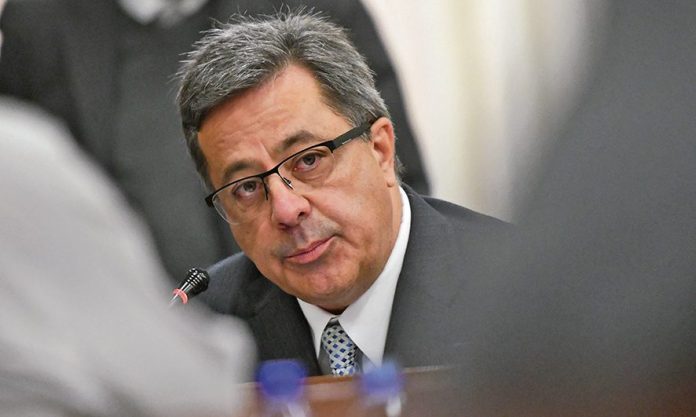Disgraced former Steinhoff CEO Markus Jooste has been banned for 20 years from serving as a director of any company listed on the JSE.
Jooste is under fire over a Steinhoff accounting fraud scandal dating back to 2016, leading to the company’s value being wiped off the markets in a short space of time.
Jooste neglected his responsibility as CEO at Steinhoff at the time when the transgressions occurred, according to the JSE, which confirmed that he violated listing requirements and ignored irregularities.
The JSE said Jooste failed to fulfill his duties to ensure that listed companies complied with listing requirements, and has concomitantly slapped him with a R15-million fine for violating the listing requirements and submitting false financial statements.
He has also been penalised R7.5-million for releasing false and misleading financial statements that did not comply with international financial reporting standards.
The transgression
According to the JSE, Jooste used handwritten notes to instruct the then financial officer, Ben la Grange, to approve a bogus transaction that inflated Stenhoff’s income to more than R375-million.
“Steinhoff at Work was a subsidiary of Steinhoff Investment Holdings Limited whose ultimate holding company was Steinhoff which has a dual listing on the JSE,” the JSE said in a statement.
“Steinhoff joined a structure referred to as the ‘buying group’ through its involvement with the TG Group Holding SA and its subsidiary companies [TG Group], whereby volume rebates were purported to be negotiated and collected by TG Group for the Steinhoff Group, as well as other third parties.
“During mid-November 2016, Mr Jooste created a handwritten document indicating the pro rata contributions in the amount of €23.5-million [R430-million], which Steinhoff at Work would be entitled to receive from the TG Group. There was no actual transaction nor any legitimate commercial reason that supported the information or calculations contained in the handwritten document.”
The bourse explained futher: “Mr Jooste gave this handwritten document to Mr Ben la Grange, the chief financial officer of Steinhoff at the time, to generate a false invoice to the TG Group for the contributions to be received by Steinhoff at Work from TG Group.
“Mr La Grange instructed others to process the invoice that had been given to him by Mr Jooste. He also instructed others to record the pro-rata contributions in the Steinhoff at Work accounting records for the financial year ended 30 September 2016.”
However, the JSE said because there was no actual transaction to support the invoice, the invoice issued by Stenhoff at Work and the accounting records were false.
“Thereafter, other Steinhoff representatives created various documents and gave instructions for monies to be transferred between Steinhoff Group bank accounts to create the impression that the pro-rata contributions were actually paid to Steinhoff at Work by the TG Group and to be used as audit evidence for the Steinhoff at Work September 2016 audit.
According to the JSE, the TG Group did not make any payments for the contributions and they were never negotiated or collected.
“The result of this fictitious transaction by the processing of the false invoice was that Steinhoff at Work’s income for the 15 months ended September 2016 was falsely inflated by R376 649 872, which in turn falsely inflated the income of the Steinhoff Group. The Steinhoff Group therefore had to restate its financial statements to rectify the incorrect income previously recorded.”
The JSE said that Steinhoff’s operating profit of R47 545 585 should have been a loss of R339 104 287 without the fictitious income, noting that the loss should have been reflected in the company’s consolidated financial statements.
It added that Jooste, who was the highest-ranking executive in the company at the time and had the ultimate responsibility for the decisions and actions of management, should have known that Steinhoff’s previously published financial information had failed to comply with international financial reporting standards and was false and misleading.
The Censure
Jooste had initially denied knowledge of any accounting irregularities and said he would challenge the JSE.
The JSE had imposed a public censure and financial penalities amounting to R13.5-million against Steinhoff after it had failed to ensure that listed companies complied with the bourse’s listing requirements.
However, Jooste disagreed with JSE’s findings and moved to appeal in terms of the provisions of the Financial Sector Regulation Act (FSRA).
“On 14 December 2022, Mr Jooste applied to the Financial Services Tribunal in terms of section 231 of the FSRA for an order suspending the decisions of the JSE. On the same day, Mr Jooste also applied for the reconsideration of the decisions of the JSE in terms of section 230[1] of the FSRA. The JSE opposed Mr Jooste’s suspension and reconsideration application,” said the JSE.
On Tuesday, deputy chairperson of the Financial Services Tribunal, retired judge Harms, dismissed Jooste’s application against the censure and upheld his appeal against the fines, which will be argued at a later date.
The JSE said it would await the outcome of the reconsideration application in relation to the enforcement of the fines, however, it would oppose it.
“In the circumstances, the JSE is entitled to publish this censure, and to disqualify Mr Jooste from holding the office of a director or officer of a listed company for a period of 20 years.
“The JSE will await the outcome of the reconsideration application in so far as the enforcement of the fine is concerned. The JSE will continue to oppose the reconsideration application.”
Also read: Steinhoff still struggling to recoup R600m from disgraced Jooste
For more business news from Sunday World, click here.
Follow @SundayWorldZA on Twitter and @sundayworldza on Instagram, or like our Facebook Page, Sunday World, by clicking here for the latest breaking news in South Africa. To Subscribe to Sunday World, click here




